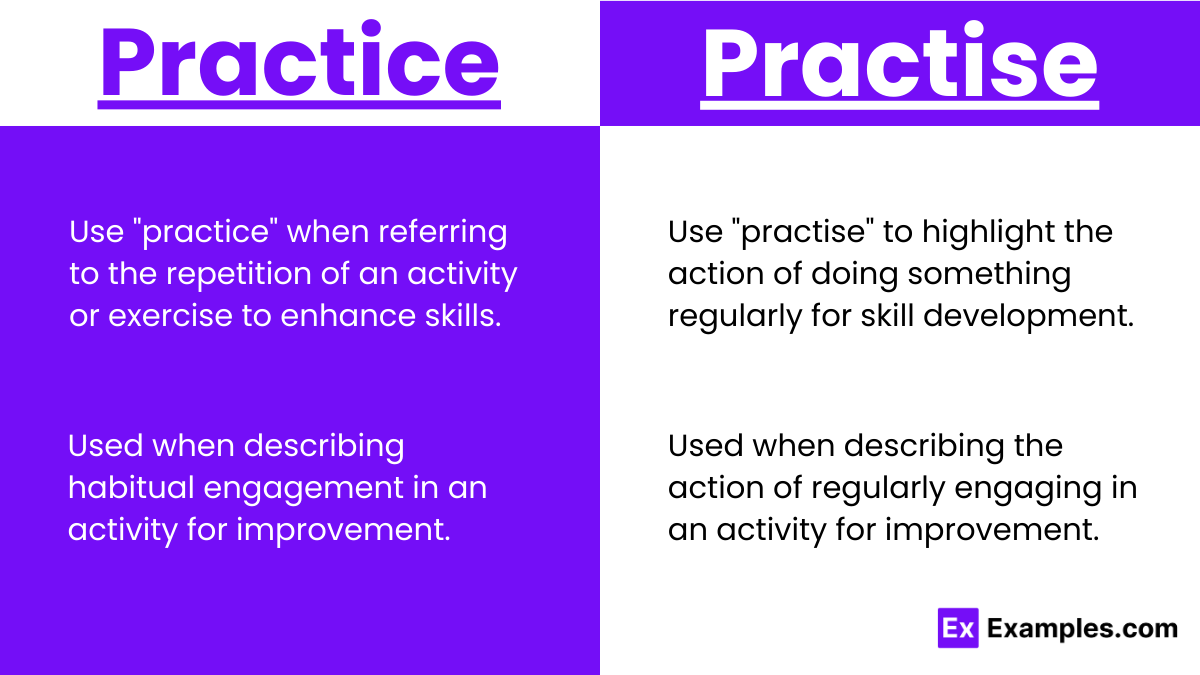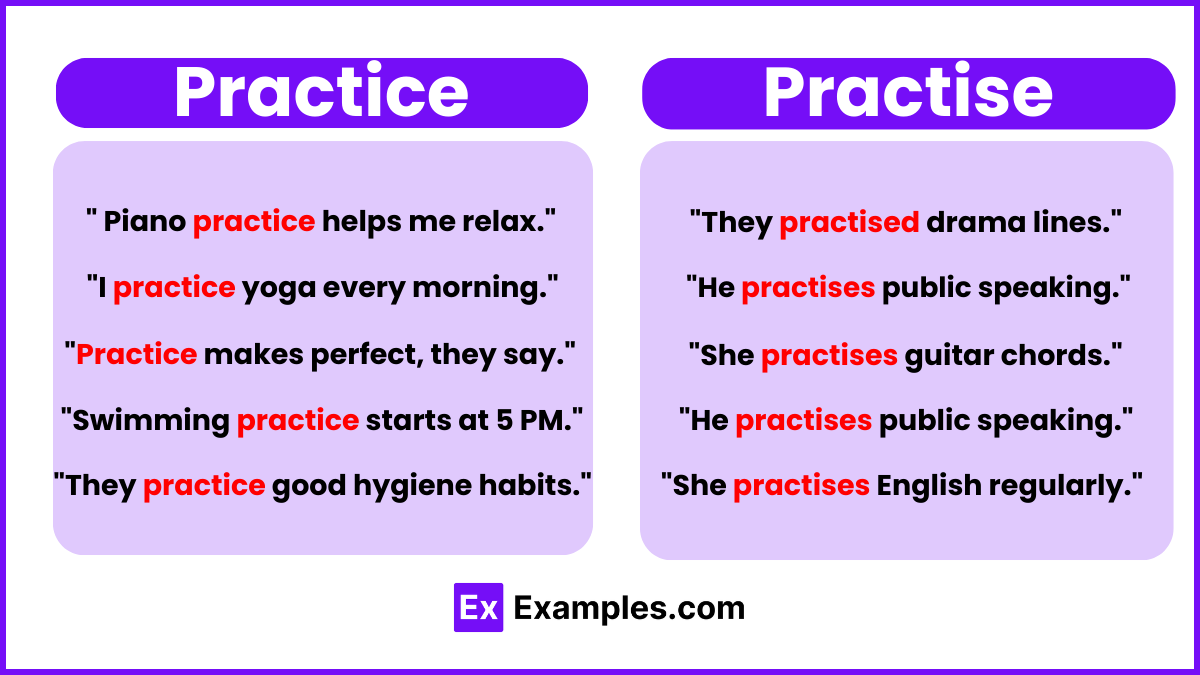Practice vs Practise – Meanings, Differences, Usage, Examples
In American English, the word ‘practice‘ serves as both a noun and a verb, encompassing the notion of training or engaging professionally. However, in British English, ‘practice‘ denotes the noun form, while ‘practise‘ is exclusively reserved for the verb meaning to engage in repetitive training. Let’s delve into the fine distinction between these spellings and their usage in respective contexts.”
Practice and Practise – Meanings
- Practice : As a noun, It refers to the act of performing or exercising something regularly or repeatedly to acquire proficiency or skills. As a verb, It means to perform or engage in an activity or skill regularly or repeatedly in order to improve or maintain proficiency.
- Practise : While “practise” is more commonly used in British English, in American English, it’s generally considered a variant spelling of “practice” and carries the same meaning as the verb form of practicing. It indicating the act of engaging in a specific activity or skill in order to improve one’s proficiency. It is the action of carrying out a particular task repeatedly.
Summary
How To Pronounce Practice and Practise
- Practice: Pronounced as /ˈpræk.tɪs/.
- Practise: Pronounced as /ˈpræk.tɪs/.
Differences Between Practice and Practise
| Aspect | Practice | Practise |
|---|---|---|
| Spelling | Commonly used in American English. | Less common in American English, more common in British English. |
| Noun Form | Used as a noun, meaning the act of performing or engaging in an activity regularly to improve skills. | Not typically used as a noun in American English. |
| Verb Form | Used as a verb, meaning to perform or engage in an activity regularly to improve skills. | Used as a verb, synonymous with “practice.” |
| Usage Frequency | More widely recognized and used in American English. | Less commonly used in American English. |
| Standardized | Standard spelling in American English. | Alternative spelling mainly found in British English. |
| American Usage | Preferable spelling for both noun and verb forms. | Less preferred spelling for both noun and verb forms. |
| British Usage | Less commonly used, but understood. | More commonly used, especially in British English. |
| Global Usage | Widely understood in English-speaking countries. | May cause confusion outside of British English context |
Tricks to Remember the Difference Between Practice and Practise
- American Preference:
- “Practice” is the norm in American English, just like “license” or “advice.” It’s what you’ll typically see and use in the US.
- No “S” in US:
- “Practice” contains an “S,” which stands for “Standard” in American English. So, remember, in the US, it’s always “practice,” never “practise.”
- Stick with “C” for Consistency:
- “C” in “practice” stands for “Consistency” in American English. Stick with it to stay consistent in your writing.
- Common Usage Cue:
- “Practice” is as common as pie in the United States. Remember that when in doubt, go with what’s familiar.
- Visualize the Correct Spelling:
- Picture the word “practice” with its “C” as a flag waving proudly in the land of American English.
When To Use Practice and Practise

Usage of Practice
- Repetition for Improvement: Use “practice” when referring to the repetition of an activity or exercise to enhance skills.
- Habitual Action: Employ “practice” to describe habitual engagement in an activity for improvement.
- Skill Development: It denotes the process of honing abilities through repetition and effort.
- Routine or Discipline: “Practice” may imply a disciplined approach towards skill enhancement.
Usage of Practise
- Engaging in Activities: Reserve “practise” for describing the action of regularly engaging in an activity for improvement.
- Continuous Effort: Use “practise” to highlight the ongoing effort or action of doing something regularly for skill development.
- Skill Enhancement: It signifies the deliberate action of engaging in activities to enhance proficiency.
- Commitment to Improvement: “Practise” may indicate dedication or commitment to mastering a skill through regular engagement.
Practice and Practise – Examples

Practice Examples
- He needs to do more practice to improve his basketball skills.
- Regular practice is essential for mastering any musical instrument.
- She dedicates hours of practice to perfect her painting technique.
- She’s been attending choir practice every week.
- The band’s practice went late into the night.
Practise Examples
- She practises yoga every morning to maintain flexibility and strength.
- They need to practise their lines for the play repeatedly.
- He practises his speech in front of the mirror to overcome stage fright.
- She practises her English pronunciation regularly.
- He practises his handwriting to make it neater.
Synonyms for Practice and Practise
| Practice | Practise |
|---|---|
| Drill | Exercise |
| Training | Rehearsal |
| Preparation | Application |
| Routine | Habit |
| Custom | Usage |
Exercises
- She ___________ the piano for two hours every day.
- The basketball team has been putting in a lot of ___________ for the upcoming tournament.
- It’s important to ___________ good hygiene habits.
- He needs to ________ his guitar chords regularly to improve his skills.
- It takes dedication to __________ yoga regularly.
Answers
- practices
- practice
- practice
- practise
- practise
FAQ’S
Which is correct: practice or practise?
“Practice” is correct in American English, while “practise” is more common in British English. Use “practice” as a verb or noun in the US.
Is it practise or practice in Canada?
In Canada, both “practice” and “practise” are accepted, but “practice” is more commonly used, following American English conventions.
Do you put into practise or practice?
In American English, use “practice” as a noun or verb. So, it’s “put into practice.” “Practise” is used primarily in British English.
Is it “Practice makes perfect” or “Practise makes perfect”?
The correct phrase is “Practice makes perfect” in American English. “Practise” is the British English spelling, but not commonly used in this phrase.


